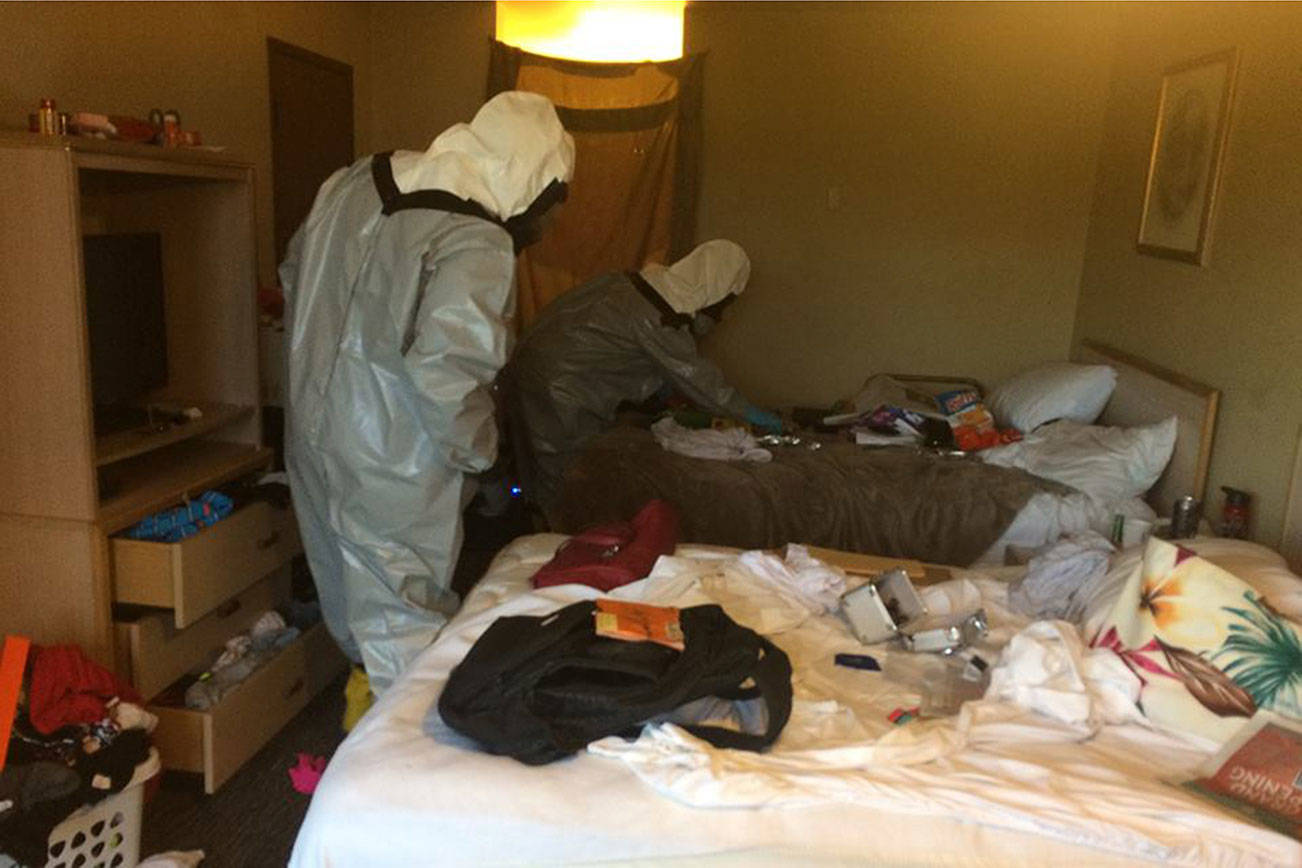As if there weren’t enough drug problems, now there is another.
Three Arlington police officers were hospitalized Aug. 14 after having violent reactions to second-hand heroin smoke.
The incident illustrates the heightened new risks that first responders face amid the opioid crisis – a potentially deadly threat that extends not only to police and fire personnel, but to anyone who comes into contact with the drug.
Officers on a warrants call to the Arlington Motor Inn at Island Crossing found a 33-year-old woman in a second-story room, who allegedly smoked heroin “right in front of our officers,” a felony, city spokeswoman Kristin Banfield said Thursday.
After returning to the station, the officers, two men and a woman, suffered from nausea, headaches and vomiting. They were taken to Cascade Valley Hospital in Arlington then and released later that evening.
Because of the intensity of the officers’ symptoms, the heroin is being tested to see whether it was laced with fentanyl, a synthetic opioid sometimes referred to as “super” heroin that is up to 50 times stronger than street heroin. It is turning up on local streets more regularly, police say.
“It’s a scary situation we’ve been in hundreds of times before,” Arlington Police Chief Jonathan Ventura said. “There’s just no way around it.”
Laced heroin has police exercising caution, and making police departments change how they operate.
“It’s a stark reminder that we do need to be cautious in how we do things,” Ventura said. “We need to slow down and be deliberate and on alert when entering a home,” or a hotel room, or searching a vehicle at a police stop.
“Fentanyl is a big risk to us and anyone who comes into contact with it,” Ventura said. “It’s not just the first responders, which is where my heart goes first.”
The risk of exposure to fentanyl is far-reaching.
Marysville Police Chief Rick Smith said Thursday that as “an old dope cop” he always has his officers looking out for such situations. He said officers never know what drugs might be infused with, so they are provided training to keep safe.
Smith said they haven’t had to deal with anything like Fentenyl yet, but if they did he would want to bring in a hazardous materials team.
“Fentenyl is a different animal,” Smith said. “We try to keep our people up to date” on different ways to be safe.
After the hotel room arrest, the officers’ clothing was taken to Arlington Fire House 46 for decontamination using their extractor. Four police vehicles, three work stations and other areas of the police department had to be decontaminated by a private company.
Exposure also can happen to emergency room doctors and nurses and postal workers who unknowingly handle shipments of fentanyl illegally entering the country from places like China and Mexico either in pure form or laced into counterfeit prescription drugs. It even can extend to hotel cleaning staff entering a room where illicit drug activity has occurred.
In one recent case, three nurses at a hospital in Ohio lost consciousness while cleaning a room where an overdose victim had been treated, The Associated Press reported. The nurses were believed to have been exposed to fentanyl, and were administered the overdose reversal drug naloxone to reverse the symptoms.
A trace amount of fentanyl can cause an overdose or death, and it can be inhaled or absorbed through the skin when it becomes airborne. It has no smell, and you can’t see it.
Ventura said, “The heroin epidemic is so bad now that addicts are turning to heroin laced with fentanyl, chasing the high that they can’t get anymore from just the heroin alone.”
The alleged heroin smoker was booked into the SCORE jail in Des Moines on an outstanding warrant and complaining of similar symptoms also requiring medical attention.
This is Arlington’s first case since a new law took effect July 23 making it easier for local governments and county health officials to evict residents, test and clean up buildings contaminated by certain hazardous chemicals, rather than having to prove the presence of clandestine drug manufacturing activity.
The Snohomish Health District says the county recorded the state’s second-highest number of fentanyl deaths last year, and 245 people were treated for drug overdoses in the first three months of this year alone.
The federal Drug Enforcement Administration released a video to law enforcement nationwide about the dangers of fentanyl to officers, including improper handling.
The DEA advises law enforcement not to field test it in their car, or on the street, or take it back to the office. Instead, the agency recommends transporting it directly to a lab where it can be safely handled and tested.
First responders wear gloves and masks when handling the potentially lethal potent drugs, and now responders are being advised to “double-glove” because a single layer doesn’t provide enough protection.
Ventura said the department may need to reevaluate whether it needs to bolster its protective safety gear.
Fire Chief Bruce Stedman said that as more of these types of calls come in where fentanyl may be involved, “We’re taking more of a safer approach as far as handling hazardous materials at incidents.
“We’re also having conversations with law enforcement and the hospital concerning how we can provide the safest environment for all our workers,” he said.
Stedman said Arlington Haz-Mat crews are taking the same approach as they did during the ricin scare four years ago. Ricin, a deadly poison, was found on letters mailed to politicians – one even addressed to President Obama.
“We’re getting fully masked up and gloved up,” Stedman said. “Once the Haz-Mat call is done, we’re doing d-conning on all of our equipment, too.”







